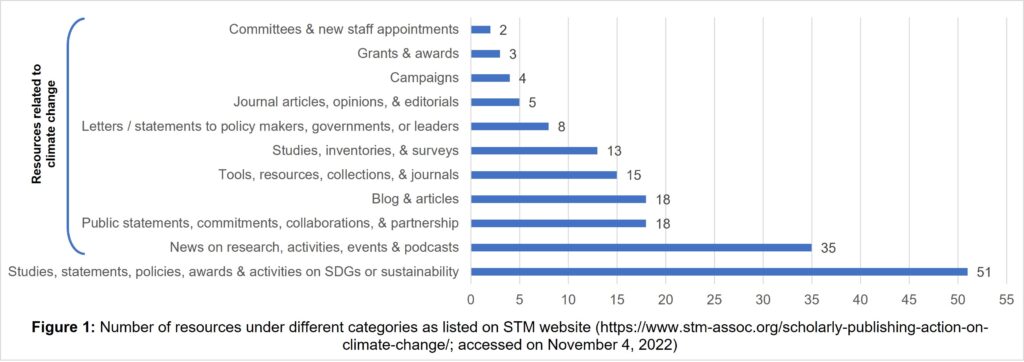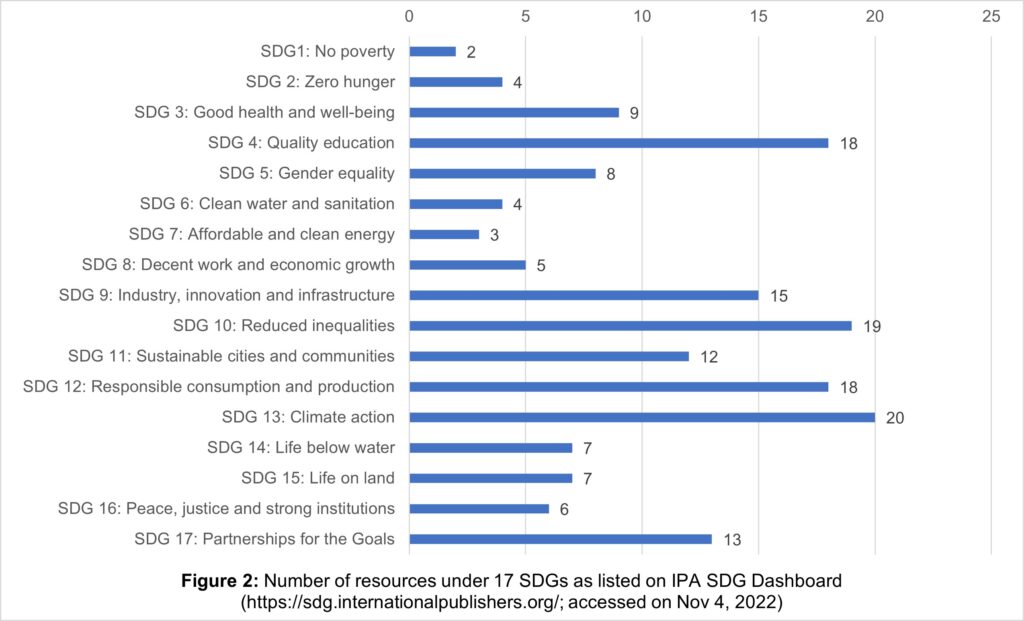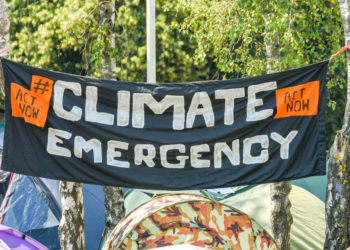Over the past few months, the STM Association’s website has been featuring a prominent banner titled “Scholarly publishing action on climate change”. A click on this feature takes us to a webpage which summarizes how STM’s members are working individually as well as collaboratively to fight climate emergency.
On November 4, 2022, I went through three sections of this page: i) Member Initiatives and Acts of Support, ii) Member Resources, and iii) Member Collaborations: Initiatives and Resources, and reviewed the resources listed there. Figure 1 below classifies 172 items from 61 organizations into different categories. Duplicate entries and inactive/irrelevant links were omitted from this calculation.

A wide range of resources were listed on STM’s climate action webpage ― from news items to public statements to studies to staff appointments. It is, however, interesting to note that 30% of these entries were not directly related to climate change, but rather were focused on sustainable development, sustainability, or Sustainable Development Goals (SDGs) in general. Among the climate change-related resources (70% of total entries), news items on different organizational activities topped the list (20% of the total entries), followed by public disclosure of commitments and collaborations (10%), blogs and articles (10%), tools and other resources (9%), and studies (8%).
Organization-wise, 45 organizations had 1 to 3 entries, 10 had 4 to 6 entries, while 5 had 7 to 10 entries. One organization’s sole entry was found not relevant. Further, while it is good to see 27 organizations out of 61 showing commitments towards sustainability and the SDGs, 15 (out of 27) did not have any entries on climate change.
The resources listed on the STM website is by no means an exhaustive collection, thus cannot be used to measure individual STM member’s commitment towards addressing climate change. This is, however, a fantastic example of what we have been collectively doing, achieving, or at least committing to fight climate crisis.
In October 2020, the SDG Publishers Compact was launched at the Frankfurt Book Fair. In July 2022, I wrote a piece on the progress made by some individual signatories to this novel initiative. In 2021, the International Publishers Association (IPA), the co-leader of the Compact, established its SDG Dashboard where resources and efforts towards 17 SDGs are brought together. This gives the Compact signatories an opportunity to regularly update and share their contributions on a central platform. A visit to this site on November 4, 2022 revealed a total 170 entries recorded under 17 SDGs, as mapped in Figure 2.

The highest 20 entries were found under the climate action (SDG 13) section of the IPA SDG Dashboard, followed by SDG 10 (reduced inequalities, 19 entries), SDG 4 (quality education, 18 entries), and SDG 12 (responsible consumption and production, 18 entries). The climate action entries included a wide range of climate-related initiatives, such as ways to achieve climate-/carbon-positive publishing, repositories of relevant resources, ensuring responsible consumption/supply chains, useful guidelines/protocols, and climate-neutral branding.
A thorough stocktaking of the progress made by the signatories towards the SDG Publishers Compact’s 10 action pointswould help us to understand how we are doing in terms of climate action. A survey of the Compact signatories was recently conducted, and the initial results were presented by UN Publications at the 2022 Frankfurt Book Fair. Earlier, on October 12, the European Association of Science Editors (EASE) and HESI (Higher Education Sustainability Initiative) SDG Compact Fellows organized a workshop on a survey on the SDG Publishers Compact, which they had recently launched to find out how editors, publishers, and their organizations are contributing to achieving the SDGs. This survey may also help us to recognize publishers’ climate actions when the results are made public in Spring 2023.
On October 4, IPA and the Federation of European Publishers (FEP), on behalf of 20 initial signatories, launched the Publishing 2030 Accelerator to address climate emergency. The Accelerator is committed to take climate actions by “calculating the carbon footprint of an individual book, distributed printing, and reimagining the accounting of revenues” ― as three initial workstreams. The signatories of the Accelerator are also committing “to take responsibility, drive change, accelerate action, share experiences, and hold each other accountable for progress on climate.” It is of course too early to say how this new initiative will be operationalized and add value to the other ongoing efforts.
The focus on the publishing industry’s climate action continued this October as the Frankfurt Book Fair highlighted related issues in a number of sessions. IPA’s Second Sustainability Summit had a discussion on the Publishing 2030 Accelerator and a presentation on the first carbon label prototype for an individual book. Later in the week, the UN organized a session on how young readers can support climate action as a part of the SDG Book Club. Linked to the SDG Publishers Compact, a session was also held by the UN on how publishers can combat climate change. Such focus, however, is not surprising since lately we are seeing climate change receiving a lot of traction in the publishing arena. For example, publishing entities joining the Climate Change Knowledge Cooperative; about 100 publishers signing up for the Publishing Declares Climate Action pledge; experts exploring the climate responsibilities of scholarly publishing; and Scopus currently indexing 36 journals with the word “climate” in their titles.
Whether political or organizational, commitment towards a societal challenge such as climate change starts with publicly recognizing the problem. The initiatives I have described above sufficiently showcase such commitments from publishing entities, both individually and collectively. These examples also highlight the second aspect of our commitment ― preparing plans to take actions against climate crisis. While we are aware of and praise individual actions and successes, reporting is not widely present across the industry and does not sufficiently and effectively capture the progress we have been making.
Financing climate action is the third element of our commitment. Inadequate financial resource is often identified as a concern to take appropriate climate actions — shifting to renewable energy or offsetting publishers’ carbon emissions by carbon trading, for example. But, in many cases it is not about whether we have any money to “spare” for climate action, rather it is about how we are prioritizing our spending, how we are valuing our responsibility towards our common future, which demands serious transformation in the way we operate as a business. Growth is crucial for any industry. But we need to redefine “growth”, and “profit”, and “investment” for that matter as we revisit and restructure our publishing business models.
As mentioned earlier, our commitments do not make any sense unless we regularly monitor our performance (the fourth element of our commitment). Tracking the effectiveness of our climate actions and new challenges we face will provide us with evidence to properly respond to the changing situations in our industry and the society we operate in, thus helping us to manage our actions adaptively ― the fifth aspect of our climate commitment.
As I close this piece, I want to focus on two specific issues. Towards the end of 2021, as the COP26 climate conference was taking place in Glasgow, UK, we saw some commendable actions from the publishing industry ― a joint statement from book publishers; discussing why the COP26 was critical for publishers; highlighting the importance of climate research to make decisions at the COP26; and publishers virtually showcasing their climate crisis and sustainability books. We haven’t seen similar activities yet, of course, except publishing news, comments, or articles on COP27 as publishers. Publishers and their associations need to be an active part of global conversations on climate change, going beyond talking among themselves.
Speaking of going beyond our usual arenas, publishers’ climate conversations often focus on the Global North, while a good number of publishing entities are located in the Global South ― essentially in countries with very low per capita carbon emissions. Can the publishers in the North and the South collaborate on climate actions? Have we ever explored that avenue? After all, we are taking about a global crisis which demands global actions.
Discussion
1 Thought on "Climate Action: Are We Committed Enough?"
I had not heard of STM, being part of the radical Open Access movement. But “But we need to redefine “growth”, and “profit”, and “investment” for that matter as we revisit and restructure our publishing business models.” struck me. Indeed the membership does. Many of them charge too much under PLAN S and similar initiatives, pay their execs way too much and the rank and file workforce too little [including outsourcing to India, Philippines, etc]], and have attracted the ire of academics worldwide for this and more. Degrowth has now entered the IPCC reports – how about for commercial publishers? Reduce profit expectations. Egalitarian approach to wages. Give stuff away. Break the legacy of hyperprofits tracing back to Robert Maxwell and Pergamon Press/ Elsevier. Extend Research4Life.



